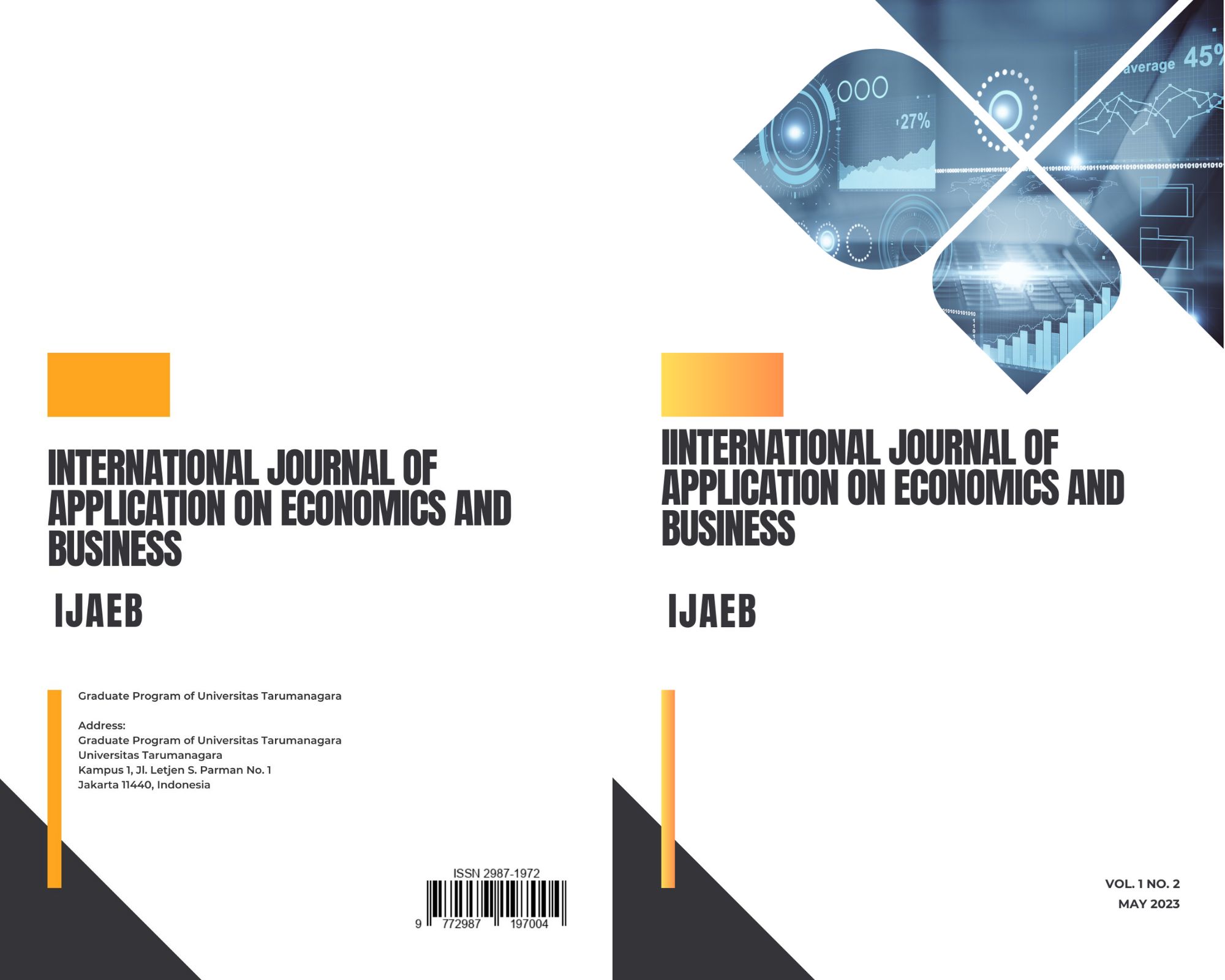THE INFLUENCE OF INFLATION, CRUDE OIL PRICES, AND THE RAMADAN EFFECT ON STOCK RETURN
Main Article Content
Abstract
This study aims to examine the effect of Inflation, Crude Oil Prices, and Ramadan Effect on Stock Return of manufacturing companies in Indonesia listed on the Indonesia Stock Exchange (IDX) during 2020. In this study, the sample selection technique used was purposive sampling with some predetermined criteria. This study shows that the independent variables in the form of Inflation and Crude Oil Prices have no effect on Stock Return. The other independent variable, Ramadan Effect shows a positive effect on Stock Return.
Article Details
Section

This work is licensed under a Creative Commons Attribution-NonCommercial-ShareAlike 4.0 International License.
This journal provides immediate open access to its content on the principle that making research freely available to the public supports a greater global exchange of knowledge.
IJAEB by Graduate Program of Universitas Tarumanagara is licensed under a Creative Commons Attribution-NonCommercial-ShareAlike 4.0 International License.. Permissions beyond the scope of this license may be available at https://journal.untar.ac.id/index.php/ijaeb
References
Martalena, dan Malinda, Pengantar Pasar Modal, Edisi Pertama, Yogyakarta: Andi, 2011.
G. Ackley and S. B. Joedano, Teori Ekonomi Makro. Jakarta: Yayasan Penerbit Universitas Indonesia, 1973.
R. P. Bagozzi, M. Gopinath, and P. U. Nyer, “The role of emotions in marketing,” Journal of the Academy of Marketing Science, vol. 27, no. 2, pp. 184–206, 1999. https://doi.org/10.1177/0092070399272005
E. I. Siregar and D., “The impact of political risk and macroeconomics on stock return at Indonesia Stock Exchange (an approach of Arbritage pricing theory (APT)),” KnE Social Sciences, 2019. https://doi.org/10.18502/kss.v3i26.5412
A. W. Lo, Adaptive markets hypothesis: Market efficiency from an evolutionary perspective. Cambridge, MA: MIT Sloan School of Management, 2004.
Irham Fahmi & Yovi L Hadi, Teori Portofolio dan Analisis Investasi. Bandung: Alfabeta, 2009.
Natsir, M, Ekonomi Moneter dan Perbankan Sentral. Jakarta: Mitra Wacana Media, 2014
“PT Bursa Efek Indonesia - indonesia stock exchange.” [Online]. Available: https://www.idx.co.id/.
Bank Indonesia. [Online]. Available: http://www.bi.go.id/.
“Stock market quotes & financial news,” Investing.com. [Online]. Available: http://www.investing.com/.
H. bin Hilal, “Alhabib web service: Coloring with Islam,” Alhabib Islamic Web Service RSS, 05-Apr-2021. [Online]. Available: http://www.al-habib.info/.
A. S. Hijazi and M. I. Tabash, “The impact of Ramadan month on market stock returns anomalies: An empirical investigation of palestine exchange (PEX),” Investment Management and Financial Innovations, vol. 17, no. 1, pp. 253–265, 2020. http://dx.doi. org/10.21511/imfi.17(1).2020.22
Wandi Sanyota Antasari, Masithah Akbar, “Analisis Pengaruh Fluktuasi Nilai Tukar (Kurs), Inflasi dan BI Rate Terhadap Harga Saham pada Sektor Consumer Good Industry Go Public,” Jurnal Manajemen dan Akuntansi, Vol. 20, no. 2, 2019. http://journal.stieikayutangi-bjm.ac.id/ index.php/jibk/.
Alianty, H, “Pengaruh Inflasi, Nilai Tukar Rupiah (Kurs Tengah BI), PDB, Harga Emas Dunia dan Harga Minyak Mentah Dunia IHSG Periode 2009-2014,” Jurnal Eksekutif, Vol. 13, No. 2, 2016. https://jurnal.ibmt.ac.id/index.php/jeksekutif/article/view/123
C. Kwofie and R. K. Ansah, “A study of the effect of inflation and exchange rate on stock market returns in Ghana,” International Journal of Mathematics and Mathematical Sciences, vol. 2018, pp. 1–8, 2018. https://doi.org/10.1155/2018/7016792
K. Chandra, “The effect of inflation levels and oil prices on stock return food and Beverage,” Business and Entrepreneurial Review, vol. 17, no. 2, p. 135, 2019. http://dx. doi.org/10.25105/ber.v17i1.5192
M. H. Noor and A. Dutta, “On the relationship between oil and equity markets: Evidence from South Asia,” International Journal of Managerial Finance, vol. 13, no. 3, pp. 287– 303, 2017. https://doi.org/10.1108/IJMF-04-2016-0064
D. Munusamy, “Does ramadan influence the returns and volatility? evidence from shariah index in India,” Journal of Islamic Accounting and Business Research, vol. 10, no. 4, pp. 565–579, 2019. https://doi.org/10.1108/JIABR-03-2016-0025

